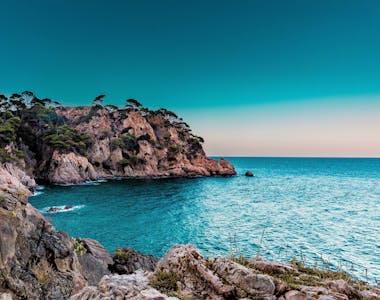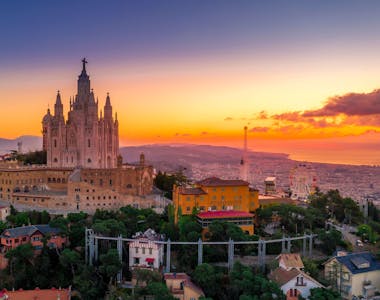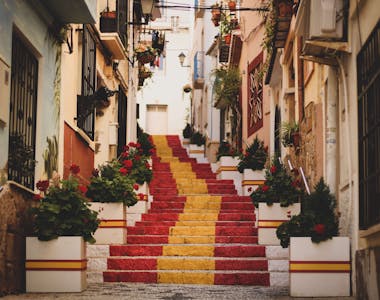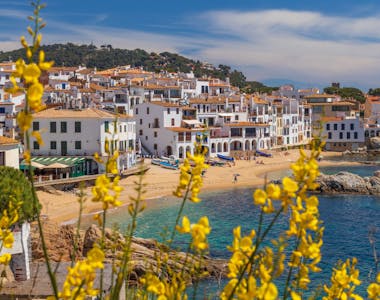Spain Tours
Salsa dancing and sangria, cycling around the islands and trekking the Pyrenees
Popular tours
- Save22%
 View Tour
View TourWalk the Camino de Santiago - 8 Days
- Sarria to Santiago de Compostela
- Age group: 12 - 100
- Max group size: 16
Was:£1,299From£1,008 - Save27%
 View Tour
View TourBest of Southern Spain - 8 Days
- Madrid to Barcelona
- Age group: 12 - 100
- Max group size: 16
Was:£1,739From£1,265 - Save37%
 View Tour
View TourSailing the Canary Islands - 7 Days
- San Miguel De Abona to San Miguel De Abona
- Age group: 16 - 100
- Max group size: 10
Was:£1,069From£674 - Save32%
 View Tour
View TourWalk the Camino de Santiago - 7 Days
- Sarria to Santiago de Compostela
- Age group: 15 - 99
- Max group size: 12
Was:£1,075From£730 - Save27%
 View Tour
View TourHiking the Canary Islands: Tenerife, Anaga, and Beyond - 6 Days
- Puerto de la Cruz to Costa Adeje
- Age group: 12 - 100
- Max group size: 16
Was:£949From£690 - Save27%
 View Tour
View TourPremium Spain - 11 Days
- Madrid to Barcelona
- Age group: 15 - 99
- Max group size: 12
Was:£4,560From£3,317
Spain Tours
Bienvenidos a España! Welcome to Spain, a land of vibrant culture, rich history, and endless adventure. Get ready to embark on an unforgettable journey with our Spain tours and holidays, designed to immerse you in the captivating allure of this Mediterranean gem. From the bustling streets of Barcelona to the sun-soaked beaches of Costa del Sol, from the majestic architecture of Madrid to the flamenco rhythms of Andalusia, Spain offers a tapestry of experiences that will leave you spellbound.
Spain is a country that pulsates with passion, where each region boasts its own unique traditions, gastronomy, and landscapes. It is a nation of diversity, where ancient traditions blend harmoniously with modern innovation, and where siestas and fiestas coexist in perfect harmony. Prepare to be captivated by the warmth of its people, the splendor of its architecture, and the zest for life that permeates every corner.
Begin your Spanish adventure in Barcelona, a city renowned for its artistic treasures and architectural wonders. Marvel at the whimsical creations of Antoni Gaudí, from the magnificent Sagrada Familia to the playful Park Güell. Stroll along Las Ramblas, immerse yourself in the vibrant atmosphere of the Gothic Quarter, and indulge in the delectable Catalan cuisine that tantalizes the taste buds.
Venture to Madrid, the lively capital city that pulsates with energy day and night. Admire the grandeur of the Royal Palace, explore the world-class museums such as the Prado Museum and Thyssen-Bornemisza Museum, and savor the culinary delights of tapas and paella in charming local taverns. Embrace the vibrant nightlife, where the streets come alive with music, laughter, and the rhythmic beats of flamenco.
No visit to Spain is complete without experiencing the enchantment of Andalusia. Seville, with its stunning Alcázar Palace and the iconic Giralda Tower, will transport you to a world of Moorish splendor. Lose yourself in the narrow streets of the charming Albaicín neighborhood in Granada, and behold the architectural masterpiece of the Alhambra, a testament to the region's glorious past. Immerse yourself in the passionate rhythms of flamenco, and let the intoxicating music and mesmerizing dance captivate your soul.
As you venture to the coast, the sunny beaches of Costa del Sol beckon. Relax on the golden sands, bask in the Mediterranean sunshine, and savor the fresh seafood delicacies that this region is renowned for. Explore the charming coastal towns of Marbella and Malaga, and soak in the laid-back atmosphere that epitomizes the Spanish beach lifestyle.
In northern Spain, discover the enchanting region of Basque Country, where a rich culinary heritage awaits. Indulge in pintxos (Basque tapas) in the vibrant streets of San Sebastian, and witness the breathtaking beauty of the rugged coastline and picturesque villages.
Spain is a gastronomic paradise, where every meal is a celebration of flavors and aromas. From the world-famous paella of Valencia to the succulent jamón ibérico of Jabugo, each region boasts its own culinary specialties that will tantalize your taste buds. Accompany your meals with fine Spanish wines, renowned for their quality and diversity.
Immerse yourself in the cultural tapestry of Spain, where art, history, and natural beauty converge. Visit the awe-inspiring Alhambra, stand in awe of Gaudí's architectural wonders, witness the legendary running of the bulls in Pamplona, and explore the historic streets of Toledo. Spain is a country that seamlessly blends ancient traditions with modern delights, offering something for every type of traveler.
With our Spain tours and holidays, you'll experience the vibrant spirit of a country that has inspired poets, artists, and adventurers for centuries. Uncover the magic of Spain with us, where each step reveals a new chapter in an unforgettable story. Let us guide you through this land of fiestas, flamenco, and boundless passion. Get ready to embark on the journey of a lifetime.
When is the best time to visit Spain?
The best time to visit Spain largely depends on the specific regions you plan to explore and the type of experience you're seeking. Spain's diverse climate and geography offer a range of experiences throughout the year. Here's a breakdown of the different seasons and regions to help you plan your trip:
Spring (March to May):
- Spring is a delightful time to visit most parts of Spain, as the weather is generally mild and pleasant.
- Cities like Barcelona, Madrid, and Seville experience comfortable temperatures and fewer crowds.
- The countryside is in full bloom, offering stunning landscapes, especially in regions like Andalusia and Catalonia.
- The famous April Fair in Seville is a highlight, showcasing the vibrant culture and traditions of Andalusia.
Summer (June to August):
- Summer in Spain is known for its warm to hot weather, particularly in the central and southern parts of the country.
- Coastal regions like Costa del Sol, Costa Brava, and the Balearic Islands (Mallorca, Ibiza, Menorca) are popular for beach vacations.
- Festivals and events, such as San Fermín in Pamplona (running of the bulls) and La Tomatina in Buñol (massive tomato fight), take place during summer.
- It's important to note that some popular tourist destinations can get crowded, especially in August when many locals take their holidays.
Autumn (September to November):
- Autumn is a pleasant season to visit Spain, with mild temperatures and fewer tourists compared to the summer months.
- The wine regions, such as La Rioja and Ribera del Duero, are particularly charming during the harvest season in September and October.
- The Mediterranean regions, like Valencia and Costa Brava, still offer pleasant beach weather during September and early October.
- Cultural events, such as the grape-stomping festivals and traditional bull runs, can be experienced in various regions.
Winter (December to February):
- Winter in Spain varies by region, with milder temperatures along the coast and colder temperatures in the central and northern parts of the country.
- Ski resorts in the Pyrenees, Sierra Nevada, and other mountainous regions offer excellent winter sports opportunities.
- Cultural events, such as Christmas markets and religious processions during Holy Week (Semana Santa), can be experienced in many cities.
- Major cities like Barcelona and Madrid have a festive atmosphere during the holiday season, with beautifully decorated streets and squares.
It's important to consider that Spain's climate varies significantly from region to region. Coastal areas enjoy a Mediterranean climate with hot summers and mild winters, while inland regions experience more extreme temperatures, especially in summer and winter.
Ultimately, the best time to visit Spain depends on your preferences and the activities you plan to engage in. Whether you seek beach relaxation, cultural exploration, or outdoor adventures, there's a season and region in Spain that will cater to your desires.
Will I need a visa to travel to Spain?
Whether or not you will need a visa to travel to Spain depends on your nationality and the purpose and duration of your visit. Here are some general guidelines:
European Union (EU) and Schengen Area Citizens:
- Citizens of EU member countries, as well as Iceland, Liechtenstein, Norway, and Switzerland, can enter Spain with a valid passport or national ID card and stay for an unlimited period.
Visa-Free Travel for Non-EU Citizens:
- Citizens of certain countries, such as the United States, Canada, Australia, New Zealand, and many others, can enter Spain and the Schengen Area for tourism or business purposes without a visa for up to 90 days within a 180-day period.
- It's important to check the specific visa-free requirements and restrictions for your country before traveling. Ensure that your passport is valid for at least six months beyond your planned departure date.
Visa Requirement for Non-EU Citizens:
- Citizens of countries that are not visa-exempt must obtain a Schengen Visa before traveling to Spain.
- The type of visa you need depends on the purpose of your visit. If it's for tourism, you'll generally need to apply for a short-stay Schengen Visa (type C).
- The visa application process usually involves submitting an application form, supporting documents (such as a valid passport, proof of travel insurance, accommodation details, and financial means), and paying a fee.
- It's recommended to apply for a visa well in advance of your planned travel dates, as processing times can vary.
It's essential to check with the Spanish embassy or consulate in your country or the official website of the Spanish Ministry of Foreign Affairs for the most up-to-date and accurate information regarding visa requirements.
Additionally, if you plan to visit other Schengen countries besides Spain, it's important to note that the Schengen Visa allows for travel within the entire Schengen Area for the duration specified on the visa.
Please keep in mind that visa regulations can change, so it's crucial to verify the requirements based on your nationality and travel circumstances before planning your trip to Spain.
What are the must see destinations in Spain?
Spain is a country rich in history, culture, and natural beauty, offering a plethora of must-see destinations. Here are some of the top attractions and must-visit places in Spain:
Barcelona: This vibrant city is famous for its unique architecture, including the awe-inspiring Sagrada Familia and Park Güell, both designed by Antoni Gaudí. Explore the lively Las Ramblas, visit the Gothic Quarter, and soak up the Mediterranean atmosphere.
Madrid: As the capital of Spain, Madrid is a cultural hub with world-class museums like the Prado Museum, Thyssen-Bornemisza Museum, and Reina Sofia Museum. Don't miss the magnificent Royal Palace, Retiro Park, and the bustling Plaza Mayor.
Seville: Known for its rich Moorish heritage, Seville boasts architectural wonders like the Alcázar Palace and the Giralda Tower. The city's vibrant atmosphere is best experienced during the annual Feria de Abril and the Semana Santa processions.
Granada: Home to the iconic Alhambra, a breathtaking palace and fortress complex, Granada offers a fascinating blend of Moorish and Spanish influences. Explore the charming Albaicín neighbourhood and savour the local tapas scene.
Valencia: This coastal city is famous for its futuristic architecture, such as the City of Arts and Sciences. Don't miss the vibrant Mercado Central, the historic Valencia Cathedral, and the beautiful Turia Gardens.
Cordoba: Visit the magnificent Mezquita, a mosque-turned-cathedral that showcases the city's rich history. Wander through the picturesque Jewish Quarter and explore the beautiful patios adorned with colourful flowers.
San Sebastian: Located in the Basque Country, San Sebastian is renowned for its beautiful beaches, culinary delights, and the annual International Film Festival. Indulge in the city's famous pintxos (Basque tapas) and enjoy the stunning coastal scenery.
Bilbao: Home to the iconic Guggenheim Museum Bilbao, this city combines modern architecture with a rich cultural heritage. Explore the charming Casco Viejo (Old Town) and sample the delicious Basque cuisine.
Toledo: Known as the "City of Three Cultures," Toledo is a UNESCO World Heritage site with a mix of Christian, Jewish, and Muslim influences. Explore its historic streets, visit the stunning Toledo Cathedral, and admire the panoramic views from the Alcazar.
Andalusian White Villages: Discover the picturesque white villages (pueblos blancos) of Andalusia, such as Ronda, Mijas, and Arcos de la Frontera. These charming villages offer stunning views, traditional architecture, and a glimpse into rural Spanish life.
These are just a few highlights, and Spain offers many more incredible destinations, including the Costa del Sol, the Canary Islands, the Camino de Santiago pilgrimage route, and the Balearic Islands (Mallorca, Ibiza, Menorca). Each region has its own unique charm, cuisine, and attractions, making Spain a country that can be explored endlessly.
What is the local currency in Spain, and can I use credit cards?
The local currency in Spain is the Euro (€). It is widely accepted throughout the country, and you'll find currency exchange services at airports, banks, and exchange offices in major cities and tourist areas.
Credit cards are widely accepted in Spain, especially in larger establishments such as hotels, restaurants, and shops. Visa and Mastercard are the most commonly accepted cards, followed by American Express and Diners Club. You can also use your credit card to withdraw cash from ATMs, which are widely available in cities and towns.
However, it's always a good idea to carry some cash, especially for smaller establishments, markets, and rural areas where card acceptance may be limited. Smaller towns or local establishments might prefer cash payments, so it's helpful to have some Euros on hand.
It's also advisable to inform your bank or credit card company about your travel plans to Spain, as they may have security measures in place that could flag foreign transactions. This will help ensure that your cards work smoothly during your trip.
When using your credit card, be cautious of potential card fraud or theft, as in any destination. Keep an eye on your card at all times during transactions and use secure ATMs in well-lit areas. It's also recommended to have a backup payment method, such as a second credit card or a small amount of cash in case of any unforeseen circumstances.
Overall, using credit cards in Spain is convenient and widely accepted, but having some cash as a backup is always a good idea, especially when traveling to more remote or rural areas.
Is Spain a good family holiday destination?
Absolutely! Spain is an excellent family holiday destination with a wide range of attractions and activities to cater to all age groups. Here are several reasons why Spain is a great choice for a family vacation:
Beautiful Beaches: Spain is known for its stunning coastline and beautiful beaches. Destinations like the Costa del Sol, Costa Blanca, and Costa Brava offer sandy shores, crystal-clear waters, and a variety of water sports and beach activities suitable for families.
Family-Friendly Resorts: Spain has numerous family-friendly resorts and hotels that provide excellent amenities and entertainment options for children. Many resorts offer dedicated kids' clubs, pools, playgrounds, and activities to keep the little ones engaged and entertained.
Theme Parks and Amusement Parks: Spain is home to several world-class theme parks, including PortAventura World near Barcelona, which offers thrilling rides, shows, and attractions for all ages. Additionally, there are water parks, adventure parks, and zoos scattered throughout the country that provide family-friendly entertainment.
Cultural and Historical Sites: Spain's rich history and cultural heritage offer fantastic opportunities for educational and immersive family experiences. From exploring ancient castles and cathedrals to visiting UNESCO World Heritage sites like the Alhambra in Granada or the historic city of Toledo, children can learn while having fun.
Festivals and Celebrations: Spain is renowned for its vibrant festivals and celebrations, and many of them are family-friendly. Witness the exhilarating Las Fallas in Valencia, the colourful Feria de Abril in Seville, or the traditional San Fermín festival in Pamplona (though the running of the bulls may be more suitable for older children).
Gastronomy: Spanish cuisine is diverse and family-friendly, with a wide range of options to suit different tastes. From tapas to paella, children can enjoy trying new flavours and experiencing the local culinary delights. Spanish dining culture is often family-oriented, making it a pleasant experience for everyone.
Outdoor Activities: Spain's varied geography offers ample opportunities for outdoor adventures. Families can enjoy hiking in national parks, cycling along coastal paths, exploring natural reserves, and engaging in water sports like snorkeling, kayaking, or paddleboarding.
Warm and Welcoming Culture: Spanish people are known for their warmth and friendliness, particularly towards families. You'll find a welcoming atmosphere in restaurants, hotels, and attractions, making it easier to travel and explore with children.
It's important to note that Spain is a popular tourist destination, so some areas may be crowded during peak travel seasons. To make the most of your family holiday, plan your itinerary in advance, consider booking accommodations with family-friendly amenities, and aim for a balance between relaxation, cultural experiences, and outdoor activities.
With its combination of beautiful landscapes, rich history, family-friendly attractions, and welcoming culture, Spain is a fantastic destination for a memorable and enjoyable family holiday.
Is Spain a good destination for solo travellers?
Yes, Spain is a wonderful destination for solo travellers. Here are several reasons why Spain is an excellent choice for those exploring on their own:
Safety: Spain is generally considered a safe country for travellers, including solo travellers. The crime rate is relatively low, and the locals are welcoming and friendly. As with any destination, it's always advisable to take common-sense precautions and be aware of your surroundings.
Vibrant Cities: Spain is home to vibrant cities that offer a wealth of experiences for solo travellers. Barcelona, Madrid, Valencia, Seville, and Bilbao are just a few examples of cities with bustling streets, rich history, incredible architecture, and a thriving nightlife. You can immerse yourself in the local culture, explore museums and art galleries, indulge in delicious cuisine, and experience the vibrant atmosphere.
Cultural Exploration: Spain has a rich and diverse culture with deep historical roots. As a solo traveler, you can take your time to visit cultural and historical sites, such as the Alhambra in Granada, the Sagrada Familia in Barcelona, or the Prado Museum in Madrid. Dive into the local traditions, attend flamenco shows, explore ancient castles, and wander through charming old towns.
Stunning Landscapes: From the picturesque beaches of the Costa del Sol to the rugged mountains of the Pyrenees, Spain offers diverse and breathtaking landscapes. As a solo traveler, you can venture into national parks like Sierra de Grazalema or Picos de Europa, hike along scenic trails, or enjoy the tranquility of the countryside.
Gastronomic Delights: Spain is a food lover's paradise, and exploring its culinary scene is a treat for solo travellers. Indulge in tapas, paella, fresh seafood, and regional specialties. Wander through local markets, join food tours, and try out authentic restaurants, enjoying the flavours of Spanish cuisine.
Socialising Opportunities: Spain's vibrant social scene makes it easy for solo travellers to meet fellow travellers and locals. Join walking tours, take part in cooking classes, or engage in language exchange meet ups to connect with others who share your interests. Spaniards are generally warm and friendly, and you'll find plenty of opportunities to engage in conversations and make new friends.
Festivals and Events: Spain is known for its lively festivals and events throughout the year. From the running of the bulls in Pamplona (San Fermín) to the La Tomatina tomato fight in Buñol or the Semana Santa processions, these cultural events provide a unique and immersive experience for solo travellers.
Remember to plan your itinerary based on your interests and preferences, and don't be afraid to venture off the beaten path. Embrace the freedom of solo travel, stay connected with others through social networks and travel forums, and enjoy the enriching experience of exploring Spain at your own pace.
Is Spain a safe destination?
Yes, Spain is generally considered a safe destination for travelelrs. The country has a well-developed infrastructure, effective law enforcement, and a stable political environment, contributing to its overall safety.
Like any travel destination, it's always important to exercise basic caution and be aware of your surroundings. Here are some tips to ensure a safe and enjoyable experience in Spain:
Keep an eye on your belongings: Pickpocketing can occur in crowded areas, tourist sites, and public transportation, especially in popular cities like Barcelona and Madrid. Be cautious of your belongings, keep your valuables secure, and avoid carrying large sums of cash or wearing expensive jewellery.
Stay informed about local areas: Some neighbourhoods in larger cities may have higher crime rates or be less safe at night. It's advisable to research the areas you plan to visit and ask for local recommendations or advice from trusted sources.
Use licensed taxis or reliable transportation services: When using taxis, make sure they are official and have the required licenses. In major cities, consider using reputable ride-sharing services or pre-arranged transportation options for added safety.
Be cautious with your personal information: As with any travel destination, be cautious when sharing personal information, especially in public or online. Avoid sharing sensitive details with strangers or providing them to unverified sources.
Follow local laws and regulations: Familiarise yourself with local laws and regulations to ensure you comply with them during your stay. This includes respecting cultural norms, understanding alcohol consumption laws, and being mindful of local customs and traditions.
Stay connected and informed: Keep your phone charged and have emergency contacts handy. Stay updated on local news and advisories, particularly during times of civil unrest or natural disasters.
Practice responsible beach safety: If you're visiting Spain's beautiful beaches, pay attention to warning signs, adhere to lifeguard instructions, and be aware of currents and tide changes. Stay within designated swimming areas and take necessary precautions to ensure your safety.
By following these general safety precautions, you can have a safe and enjoyable experience while exploring Spain's diverse cities, landscapes, and cultural attractions. It's always a good idea to stay informed, trust your instincts, and exercise common sense during your travels.
Will I require any vaccinations to travel to Spain?
At the time of writing, there are no specific vaccinations are required for travellers entering Spain. However, it's always a good idea to consult with a healthcare professional or travel medicine clinic well in advance of your trip to get the most up-to-date information and personalised recommendations based on your medical history and current health status.
While there are no mandatory vaccinations, it is recommended to ensure routine vaccinations are up to date, including measles-mumps-rubella (MMR), diphtheria-tetanus-pertussis, varicella (chickenpox), polio, and influenza. Additionally, certain vaccines may be recommended based on the specific activities you plan to engage in and the regions you will be visiting within Spain.
For example, if you plan to spend time outdoors or participate in activities that may put you at risk for animal bites or scratches, the rabies vaccine might be recommended. If you'll be exploring rural or forested areas, particularly during the warmer months, you may consider protection against tick-borne diseases such as Lyme disease.
It's also important to note that vaccination requirements can change over time, and new recommendations may be issued by health authorities. Therefore, it is advisable to consult with a healthcare professional or visit the website of your country's travel health department or the Centres for Disease Control and Prevention (CDC) for the most up-to-date information on travel vaccinations for Spain.
Additionally, it's always a good practice to maintain general hygiene and take precautions to prevent common illnesses, such as practicing good hand hygiene, drinking safe water, and being mindful of food safety practices.
Remember, your healthcare provider or travel medicine clinic is the best source of information regarding vaccinations and health recommendations specific to your individual needs and circumstances. They can assess your medical history, review your itinerary, and provide personalised advice to ensure you have a safe and healthy trip to Spain.
How does the rooming work on tours?
Small group tours in Spain typically involve a set itinerary where you travel with a group of fellow travellers and a tour leader/guide. Accommodation arrangements vary depending on the specific tour you choose. Here are some common aspects of rooming arrangements on small group tours:
Shared Rooms: In order to promote camaraderie and facilitate interaction among group members, most tours arrange shared accommodation. This means you will be paired with another member of the same gender from the group to share a room. Roommates may sometimes change periodically throughout the tour.
Single Supplement: If you prefer to have your own room and privacy, you may have the option to pay a single supplement fee. This additional fee allows you to have your own room for the duration of the tour. However, please note that single supplements can vary in cost and availability.
Roommate Matching: Tour operators usually offer roommate matching services, where they try to pair you with a suitable roommate based on your preferences, such as age range. This can help ensure compatibility and a more enjoyable experience for all participants.
Rooming Preferences: When booking your small group tour, it's important to communicate your rooming preferences to the tour operator. If you have specific requirements or preferences, such as sharing with a friend or a specific roommate request, it's advisable to inform the tour operator during the booking process.
It's important to carefully read the tour details and inclusions provided by the tour operator to understand their specific rooming policies. If having your own room is a priority, make sure to inquire about the availability of single supplements and any associated costs before booking your tour.
Keep in mind that while sharing a room with a fellow traveller can be a great way to meet new people and build connections, having your own room provides more privacy and flexibility. Consider your preferences and the dynamics of the tour when deciding whether to opt for a shared room or pay for a single supplement.
Remember to communicate your needs and preferences clearly with the tour operator during the booking process to ensure a comfortable and enjoyable accommodation experience on your small group tour in Spain.
What is the food like in Spain?
The food in Spain is a delightful culinary experience that showcases the country's rich gastronomic heritage. Spaniards take great pride in their cuisine, and the diverse regional specialties and traditional dishes will surely tantalise your taste buds. Here are some highlights of the food in Spain:
Tapas: Tapas are a quintessential part of Spanish dining culture. These small plates of appetisers or snacks are perfect for sharing and trying a variety of flavours. You can enjoy a range of tapas, including patatas bravas (fried potatoes with spicy tomato sauce), croquetas (breaded and fried croquettes), Spanish omelette (tortilla española), gambas al ajillo (garlic shrimp), and many more.
Paella: Paella is a famous Spanish rice dish that originated in the region of Valencia. Made with saffron-infused rice, vegetables, and various meats or seafood, it is cooked in a wide, shallow pan called a "paellera." The most traditional varieties include Valencian paella (with chicken and rabbit) and seafood paella, but there are also vegetarian and mixed versions available.
Seafood: With its extensive coastline, Spain is known for its delicious seafood. From succulent prawns and langoustines to fresh fish like cod, hake, and sea bass, seafood lovers will find a wide array of options. Coastal cities and regions like Galicia, Andalusia, and Catalonia are particularly renowned for their seafood specialties.
Jamón Ibérico: Spain is famous for its cured hams, and Jamón Ibérico is considered a gourmet delicacy. Produced from the black Iberian pig, the ham is cured for an extended period, resulting in a rich and flavorful meat with a melt-in-your-mouth texture. It's often served thinly sliced as a tapa or incorporated into various dishes.
Gazpacho and Sangria: Spain's warm climate calls for refreshing beverages and chilled soups. Gazpacho, a cold tomato-based soup blended with vegetables and served chilled, is popular during the hot summer months. Another refreshing option is Sangria, a traditional Spanish drink made with red wine, fruit, and sometimes a splash of brandy or liqueur.
Pintxos in the Basque Country: In the Basque Country, particularly in San Sebastian, you'll find a delightful variation of tapas called pintxos. These bite-sized treats are typically served on a slice of bread, skewered with a toothpick. They come in a wide variety, ranging from simple combinations to more elaborate creations showcasing local ingredients and culinary artistry.
Regional Specialties: Each region of Spain has its own culinary traditions and specialties. From the hearty stews of Castilla y León to the fresh fish dishes of Andalusia and the pintxos of the Basque Country, exploring the local cuisine in different regions is an adventure in itself.
Spaniards also value the importance of leisurely meals and dining as a social activity. It's common to enjoy a long lunch, known as the "menu del día," which typically includes multiple courses and is popular among locals and visitors alike.
With its diverse flavours, emphasis on fresh ingredients, and a blend of traditional and modern culinary techniques, the food in Spain offers a gastronomic journey that is sure to satisfy every palate. Don't forget to pair your meals with a glass of Spanish wine or a refreshing glass of sangria to complete your dining experience. ¡Buen provecho!
Can I drink the tap water in Spain?
Yes, in most parts of Spain, tap water is generally safe to drink. The water supply is well regulated and treated to meet high health and safety standards. The tap water in major cities and tourist areas is considered safe for drinking, cooking, and brushing your teeth.
However, it's worth noting that the taste and quality of tap water may vary slightly depending on the region. In some places, particularly rural areas or smaller towns, the water may have a slightly different taste due to natural mineral content or local water sources. It's not a safety concern, but some people may prefer to drink bottled water for taste preferences.
If you have any concerns or are unsure about the water quality at your specific location, you can choose to drink bottled water, which is widely available in supermarkets, convenience stores, and restaurants throughout Spain. Bottled water is a convenient and safe alternative if you prefer not to drink tap water.
Additionally, when dining out, it's common for restaurants to serve bottled or mineral water unless tap water is specifically requested. Simply ask for "agua del grifo" (tap water) if you prefer it.
It's always a good idea to stay hydrated, especially during hot summer months, so ensure you have access to water, whether it's tap or bottled, to keep yourself refreshed and hydrated throughout your travels in Spain.
Are there any cultural norms in Spain I should follow?
Yes, when visiting Spain, it's helpful to be aware of and respect certain cultural norms and customs. Here are some cultural tips to keep in mind during your visit:
Greetings: In Spain, greetings are typically warm and friendly. A common greeting is a handshake or a kiss on both cheeks, known as "dos besos," when meeting friends or acquaintances. In more formal situations, a handshake is appropriate.
Meal times: Spaniards tend to have a different schedule for meals compared to other countries. Lunch, or "la comida," is the main meal of the day and is typically served between 1 pm and 3 pm. Dinner, or "la cena," is usually eaten later in the evening, around 8 pm to 10 pm. Keep in mind that restaurants may have different opening hours, especially during the afternoon siesta period.
Siesta and business hours: The concept of siesta, a midday break, is still prevalent in some parts of Spain, particularly in smaller towns and rural areas. During this time, many shops and businesses may close for a few hours in the afternoon (usually between 2 pm and 5 pm). It's advisable to plan your activities and visits accordingly.
Dress code: Spain generally has a relaxed approach to dressing, but it's recommended to dress modestly and respectfully when visiting religious sites, such as churches or cathedrals. On the other hand, in upscale restaurants or clubs, you may want to dress more formally. Remember to pack comfortable walking shoes as well, especially for exploring cities with cobblestone streets.
Language: Spanish, or Castilian, is the official language of Spain. While many people in tourist areas and major cities speak English, it's always appreciated when visitors make an effort to learn a few basic phrases in Spanish. Locals will often be more than willing to help if you attempt to communicate in their language.
Tipping: Tipping in Spain is not as customary as in some other countries, but it is still appreciated for good service. In restaurants, rounding up the bill or leaving a small percentage (around 5% to 10%) as a tip is common. In cafes and bars, it's common to leave some loose change as a tip.
Respect religious customs: Spain has a strong Catholic heritage, and you may encounter religious festivals, processions, or ceremonies during your visit. It's important to respect these traditions, maintain a respectful demeanor, and follow any instructions or guidelines given by authorities or locals.
Embrace the local pace: Spaniards value a relaxed and leisurely lifestyle. Embrace the slower pace, savour your meals, and enjoy the vibrant street life and socialising that often takes place in plazas and outdoor cafes. Avoid rushing or expecting fast-paced service, particularly during siesta hours or late at night.
By being aware of these cultural norms and customs, you can have a more enjoyable and respectful experience while immersing yourself in Spain's rich cultural heritage and traditions. Remember, each region may have its own unique customs, so it's always good to remain open-minded, observe, and adapt to the local practices during your travels.
What should I pack for a trip to Spain?
When packing for a trip to Spain, it's important to consider the season, the regions you'll be visiting, and the activities you plan to engage in. Here are some essential items to pack for your trip:
Clothing: Pack a mix of lightweight, breathable clothing suitable for the season and weather conditions. In the summer months, bring shorts, t-shirts, dresses, and lightweight pants or skirts. For cooler seasons, include a few sweaters or light jackets. Don't forget to pack swimwear if you plan to visit the beaches or enjoy poolside relaxation. If you're visiting religious sites, it's advisable to have modest clothing that covers your shoulders and knees.
Comfortable shoes: Spain is known for its charming streets and historical sites, which often involve walking or exploring on foot. Pack comfortable walking shoes or sneakers that can handle cobblestone streets and long hours of walking. It's also a good idea to have a pair of sandals or open-toe shoes for warmer weather.
Travel adapter: Spain uses the Europlug (Type C) and sometimes the Schuko plug (Type F) electrical outlets. Make sure to bring a travel adapter that is compatible with these plug types if your devices have different plug types.
Travel documents: Carry your passport, travel insurance documents, and any necessary visas or identification cards. It's also a good idea to have copies of important documents stored electronically or in a separate location.
Sun protection: Spain enjoys a sunny climate, so pack sunscreen, sunglasses, and a hat to protect yourself from the sun's rays. Especially during the summer months, the sun can be strong, so take precautions to keep your skin safe.
Daypack or tote bag: A small daypack or tote bag will come in handy for carrying your daily essentials, such as water bottles, snacks, a camera, a guidebook, and any items you may pick up during your outings.
Travel guidebook or map: While digital resources are readily available, having a physical travel guidebook or map can be helpful for navigating and discovering hidden gems in the cities and regions you'll be exploring.
Medications and personal care items: If you take any prescription medications, ensure you have an adequate supply for the duration of your trip. Pack any necessary over-the-counter medications, as well as personal care items such as toiletries, travel-sized bottles, and a small first aid kit.
Travel accessories: Consider packing a money belt or a secure pouch to keep your valuables safe. A reusable water bottle is also useful for staying hydrated on your outings.
Remember to check the weather forecast for your specific travel dates and the regions you'll be visiting to ensure you pack accordingly. It's also a good idea to pack a versatile wardrobe that can be layered for cooler evenings or unexpected weather changes. With these essentials, you'll be well-prepared for an enjoyable and comfortable trip to Spain.






Book With Confidence
Monthly Payments
Spread the costs with no interest or additional fees
Best Price Guarantee
We won't be beaten on price. If you find this adventure at a lower price please get in touch!
Reserve now & pay later
Reserve your adventure today and pay later, free of charge
ATOL protected
Book with confidence
Hold your space today, for free
or book your trip with a deposit and then pay the rest in instalments.
Reserve your flights with us
Add flights to your booking and we'll take care of the rest. You'll get 24/7 support from our team & ATOL protection.
Speak to our experts
Call or email our expert team to find out more and help with ideas and planning.









